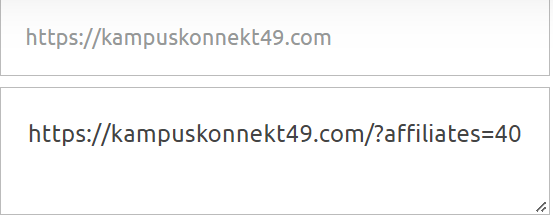Are you interested in making a side income? Or are you curious after having seen our publications on our Teachers Affiliate Programme? No matter the reason, we are here to share helpful information with you. Our Teachers Affiliate Programme allows teachers all around the world to make money by helping their students, or the families they know. As the COVID-19 crisis is slowly ceasing, students are thinking about studying abroad again. As it can be difficult for many people, you and we are here to help them. And you will get money by doing so. Let’s see how you can become our Teacher Affiliate.
Step 1: Fill Out Our Form
Don’t worry, it’s not that big of a deal. We simply ask for basic information, like your name and email address, or phone number. To register, please click here. If you need any information before making your choice, you can contact us via Facebook or LinkedIn. We will be glad to give you additional information.
Step 2: Become Familiar With The Interface
After registering, you will get your own account with access to all the data you need to evaluate your sales and income. For example, you will get an overview of the number of referrals you have made, your earnings, and the number of visits. It is also where you will get your personal link. Let us explain how to use it.

As you see, the upper part of the box is the link to the page you want to advertise. So, for each page, you will get a different link. You will need to copy and paste there the link to the product or service you want to promote.
For example, if you want to promote our Ultimate Guide to Scholarships in Germany, you will have to copy this link: “https://kampuskonnekt49.com/offers/home/42-practical-study-guide.html” and paste it into the upper part of the box. Then, you will get your personalised link below.
When people use your Teacher Affiliate link, we know you made the sales. You will get up to 30% commission on the sales you make. To know more about your efficiency, you can visit the different sections available when you log into your account: Earnings, Referrals and Traffic. The Banners section gives you some links and content to share in order to attract customers easily. If you want to change your password, visit the Profile section to do it.
Step 3: Share Your Links
Now, you have the opportunity to change people’s lives. Maybe a family you know is struggling to offer a high-standard education to their children while being on a budget. Maybe your student is interested in Germany but doesn’t talk about it because he is lost.
To help your connections, you can first share our content. We publish free articles to give an insight into life in Germany. We also plan webinars to talk about different topics, such as becoming a scholar in Germany, for example. But to earn money, you have to promote our products. You will help people by promoting our e-books and services.
Indeed, to help students, we created two e-books that allow them to save thousands of dollars. We also propose diverse services to help them with their paperwork and everything they need. If they want personal advice, we can plan one-on-one consultations too.
In fact, we have a solution for each and every student. By sharing our products and services, you will make a difference.
Step 4: Make Money
After these few steps, you can start making money. Your sales are tracked forever. Even if you stop advertising our products, if someone clicks on a link you shared and buys our product, you will get your commission. In the Referrals section, you can see what products your customers bought. You will see what products you can advertise to make more money.
Becoming our Teacher Affiliate is a great way for a teacher to help people and share knowledge. In fact, we tend to be too individualistic and forget other people have problems too. But with this programme, you can help to give better access to education. This way, you will make family and students’ lives easier.









